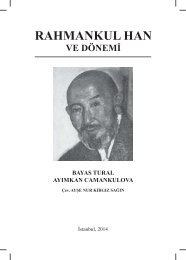THE SOVIET HISTORIOGRAPHY AND THE QUESTION OF KAZAKHSTAN’S HISTORY
SOVYET-TARIH-YAZICILIGI-ENG
SOVYET-TARIH-YAZICILIGI-ENG
Create successful ePaper yourself
Turn your PDF publications into a flip-book with our unique Google optimized e-Paper software.
<strong>THE</strong> <strong>QUESTION</strong> <strong>OF</strong> <strong>KAZAKHSTAN’S</strong> <strong>HISTORY</strong> 105<br />
dent state in 1465 comply with the state formation issue of the Kazakh<br />
nation. As evidence to our words, we can provide certain information.<br />
The state as a concept was first investigated by philosophers such<br />
as Polybius, Aristotle, Sun Tzu, Al Farabi, and Ibn Khaldoun; this concept<br />
is now widely studied by contemporary social scientists. 162 The<br />
state as a concept requires highlighting the emergence of political<br />
civilizations and their transformation processes, the logic and strategy<br />
of the reciprocal actions stemming from human-state relations, and<br />
the nature of an administration phenomenon rather than the rules<br />
of state administration or state’s political and judicial infrastructure.<br />
Furthermore, we need to research the history of states or entities in<br />
state form, which gradually developed as the “system of system” 163<br />
and prevailed in certain territories and regions during different epochs.<br />
State formation, per se, has a peculiar national and moral nature<br />
and national and cultural stance. It is like an infinite history containing<br />
certain moral values and administrative experiences. For example, we<br />
cannot confine the history of today’s independent Kazakhstan to the<br />
boundaries of the Kazakh Khanate. Our civilization’s predecessors, the<br />
Scythians, Huns, Gokturks, Golden Horde Khanate, Kazakh Khanate,<br />
their administrative norms such as Mete Shanyui Khan, Bumin Khan,<br />
Istemi Khan, Esim Khan, Kasym Khan, Tavke Khan, Abylai Khan, Kenessary<br />
Khan, and their administrative reforms along with the historical<br />
experiences, reflect our national state system.<br />
While searching the national state history, we have to:<br />
First, identify the nature and background of the phenomena, such as formation<br />
of state systems and institutions, and their transformations and decay;<br />
Second, identify the role of historical personalities who contributed<br />
to the creation and progress of the Kazakh nation’s political civilization,<br />
coupled with the state’s geopolitical, judicial, and socio-cultural aspects.<br />
Third, investigate the Republic of Kazakhstan’s state institutions<br />
(administration, administrative organizations, and their branches and<br />
ideologies etc.) and inter-institutional relations.<br />
To wit, to search thoroughly the concept of a national state on a<br />
periodic basis will undoubtedly promote our national consciousness<br />
not only as human beings but also as citizens.<br />
After summarizing the concept of state, we can observe this method<br />
clearly reflected in the Kazakh nation under Russian subjugation and<br />
concurrent state formation in Bekmakhanov’s masterpiece “Kazakhstan<br />
162 Timofeeva A. A., Problemy Stanovlenya i Razvitiya Rossiyskoy Gosudarstvennosti:<br />
uçev. Posobiye, A. A. Timofeeva, M, MPSİ, 2009, p.7.<br />
163 Şaburov. A. S., “Gosudarstvo i Gosudarstvennost’: Voprosy Sootnoşeniya”, İzvestiya,<br />
İGEA, 2012, No3 (83), pp.126-129.



